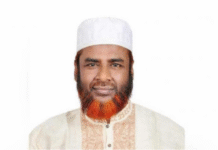
A Rohingya refugee girl looks next to newly arrived refugees who fled to Bangladesh from Myanmar in Ukhiya. Photo: AFP
Bangladesh wants a peaceful resolution to the Rohingya crisis, without becoming involved in any sort of conflict. It has appealed the international community for help in repatriating the Rohingya refugees and also to resolve the long-standing problems of the minority community in Myanmar’s Rakhine state. Bangladesh is urging with various countries and blocs to take up this issue for extensive discussion at the forthcoming United Nations General Assembly to take place in New York in the second week of this month.
Bangladesh has stepped up its communication with the international community after the Rohingya issue was discussed at the UN Security Council on 30 August this year. Over the last three days, Bangladesh has kept up steady communication with the UN. It has strongly communicated its stand on the issue to the US, Russia, Germany and the European Union. Bangladesh hopes to have the support of these countries in this regard.
The international community has observed that the recent influx of Rohingya refugees into Bangladesh is unprecedented. In this short span of time, around 125,000 Rohingyas have arrived in Bangladesh, with around 100,000 more are waiting to enter, indicating the extent of the humanitarian crisis. The international community has lauded Bangladesh’s role in accommodating this burgeoning number of refugees.
Bangladesh has been giving shelter to thousands and thousands of Rohingyas over the past three decades. The oppressive policy adopted by the Myanmar military against these people is directly and instantaneously creating a serious humanitarian crisis in Bangladesh’s southeast region. Despite lacking the resources and ability to support the pressure of over 100 thousand hapless refugees who have fled into the country, Bangladesh has somewhat relaxed its borders for their entry. As it is, over 400 thousand Rohingyas are already in Bangladesh, having entered over the past few decades.
Though Bangladesh should have raised the issue at the Security Council, it was the US Secretary General Antonio Guterres who did the job. On 5 September he issued a letter to the Security Council, calling for measures to avert a humanitarian crisis.
The role of Myanmar’s leader Aung San Suu Kyi, who won the Nobel peace prize for her long struggle to establish democracy, is being questioned. Other Nobel Laureates from around are writing her open letters, urging an end to the atrocities against the Rohingyas. Indian prime minister Narendra Modi has chosen this juncture to visit Myanmar. It is no secret that India aspires to play a leadership role in Asia. Yet at a point time when villages after villages are being razed to the ground and land mines are being laid along the border where thousands of Rohingyas are fleeing, there was no mention whatsoever of the refugee crisis in the joint statement issued after the meeting with Aung San Suu Kyi. In fact, Modi praised Myanmar’s anti-terrorist role and express his gratitude to Suu Kyi in this regard.
Yet another instance of using the threat of Islamic militancy to conceal the humanitarian crisis was evident in Naypyidaw yesterday, Wednesday. The two recent attacks by the Arakan Rohingya Salvation Army (ARSA) are being highlighted in such a manner as to evade the root cause of the problems in Arakan. Even the Kofi Annan commission initiated by the Myanmar government, has said that the main problem of the Rakhine state is the issue of citizenship. It said unless the citizenship issue is resolved, there will be the risk of extremism spreading in the country. Yet the government is looking into the symptoms rather than the root cause. The US secretary general also sees citizenship as the main problem.
The question is, was this supposed to happen this way? Bangladesh’s relationship with India at the moment, in Modi’s words, is the best of all times. Yet do not know what he discussed about Bangladesh and its struggle to accommodate the burgeoning flow of Rohingyas. But there was no mention of this problem in the joint statement, so the question is, what have our diplomats been doing over the past 10 days? Have they not conveyed our problems to Delhi? And if our stand on the issue is ignored, then perhaps our foreign policy needs a serious review.
Myanmar is eager to highlight the Muslim identity of the Rohingyas. India’s main bone of contention too is the migration of Muslims to their country. This is clear in the policy of the BJP government too. So is the shared stance of India and Myanmar because of the Muslim identity of the community? If not, we can still hope India exerts its tradition of democracy to stand up for humanity and take a strong stand to halt the genocide in Myanmar. They took such a stand against the genocide in 1071 and it is hoped they adopt the same stand now. There can be no hesitation in terming the ongoing violence in Myanmar as genocide. The US secretary general has termed the ongoing onslaught in Myanmar as nothing short of ethnic cleansing.
Source: Prothom Alo









